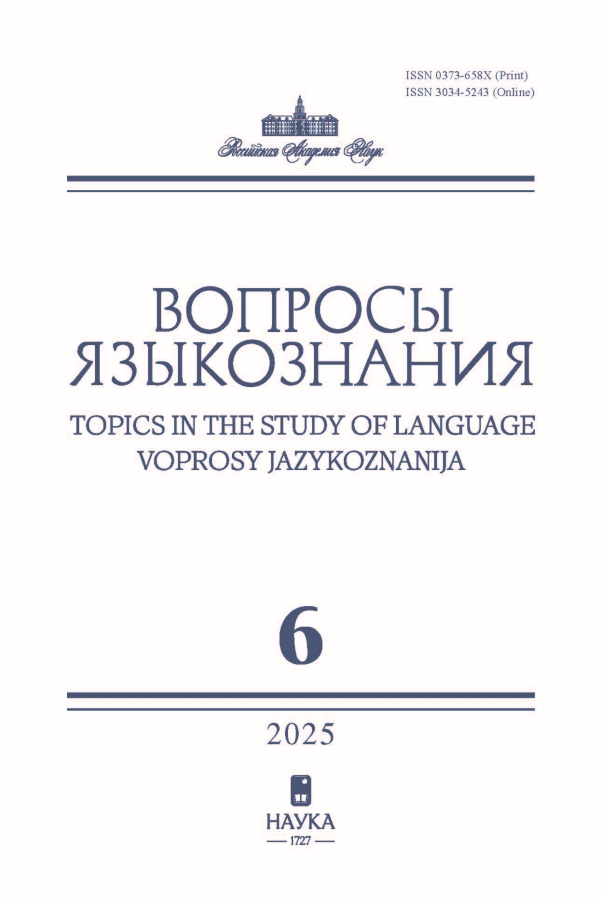编号 6 (2025)
Articles
Variation of the genitive plural forms of the noun god ‘year’ in dialect corpora
摘要
 7-34
7-34


Negative concord items inside adjective phrases in Russian: An experimental study
摘要
The article presents the results of a syntactic experiment aimed at identifying the conditions necessary for licensing of negative pronouns embedded in an adjective phrase (AdjP) by sentential negation (Trener ne byl dovolen nikem iz sportsmenov ‘The trainer was not content with anybody of the sportsmen’). The experimental results demonstrate that such licensing is possible if the adjective is predicative, and impossible if it is attributive. At the same time, for predicative AdjPs, the licensing of negative pronoun complements does not depend on the morphological form of the adjective, being possible for both long-form and short-form adjectives. As for attributive adjectives, licensing is impossible regardless of the grammatical function and case marking of the noun phrase modified by such an adjective. In particular, even adjectives modifying nominals in the genitive of negation cannot take negative pronouns as complements, if the only potential licensor of such a pronoun is the sentential negation. The article also discusses possible approaches to formal modeling of the identified constraints using the apparatus of generative syntax. The most promising approach is based on the concept of a horizon for an Agreement probe proposed by Stefan Keine (2016). Such an analysis allows one to take into account language-specific nature of the identified restrictions on the locality of intra-clausal negative concord, since negative pronouns that are complements of attributive adjectives can be licensed by sentential negation (in a contradistinction to Russian) in Spanish (a language with a non-strict negative concord) and Polish (which, as Russian, features strict negative concord).
 35-58
35-58


Morphophonology of the Kullui language and the rule of accentuation
摘要
In this article, based on field data, I investigate the rules of accentuation in Kullui through the lens of morphophonological features. Like Russian, Kullui is characterized by the reduction of unaccented vowels. However, unlike Russian, Kullui lacks a written standard, and its inflectionality, like that of other New Indo-Aryan languages, is far less developed. Furthermore, there are no accentual paradigms in word inflection. Vowel alternations in word formation provide the basis for formulating rules for the reduction of unaccented vowels. Kullui affixes are divided into three types: those that do not affect accent placement, those that cause an accent shift, and accentually independent affixes, which generate words with two accents — one on the root and one on the suffix. The first two groups exhibit characteristic syllabic structures, while the third consists mainly of borrowed or recently grammaticalized units. An analysis of affix structures, verified against a larger lexical corpus, led to the formulation of a general rule of accentuation applicable to both derived and non-derived words. According to this rule, prefixes in Kullui are unaccented. The accented syllable, when counted from the end of the word to the beginning, is the first syllable containing the vowels e, a, o or ending in a combination of a nasal with a homorganic plosive or affricate. If no such syllable exists, the accent falls on the syllable furthest from the end (i.e., the first, excluding prefixes). In words ending in a consonant, the search starts from the last syllable, and in words ending in a vowel, from the penultimate syllable.
 59-88
59-88


The Role Hypothesis and the clause structure of the Northeast Caucasian languages
摘要
 89-119
89-119


Surveys
Anthropocentric linguistics and Danish grammar: Following the book "Anthropocentric Danish Grammar"
摘要
 120-136
120-136


“Sense as event”: New studies at the interface between semantics and pragmatics
摘要
 137-143
137-143


Reviews
[Рец. на: / Review of:] М. Bergelson, D. Zoumpalidis (eds.). Multilingual Moscow: Dynamics of language and migration in a capital city. Berlin; Boston: De Gruyter Mouton, 2024. xi+188 pp. (Language contact and bilingualism, 22.) ISBN: 978-3-11075111-6.
 144-151
144-151











